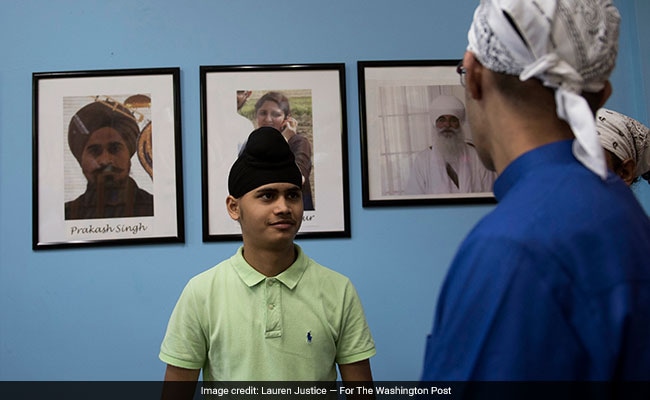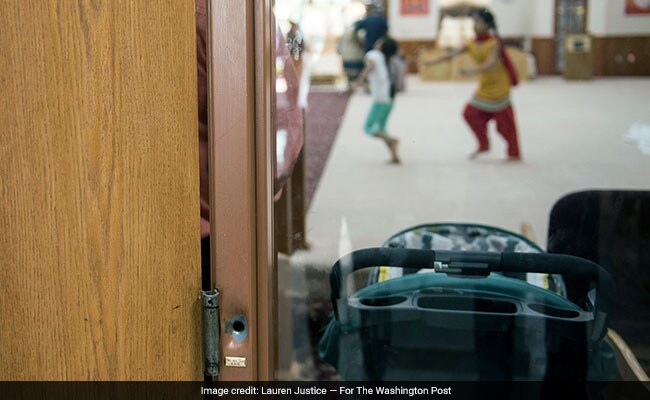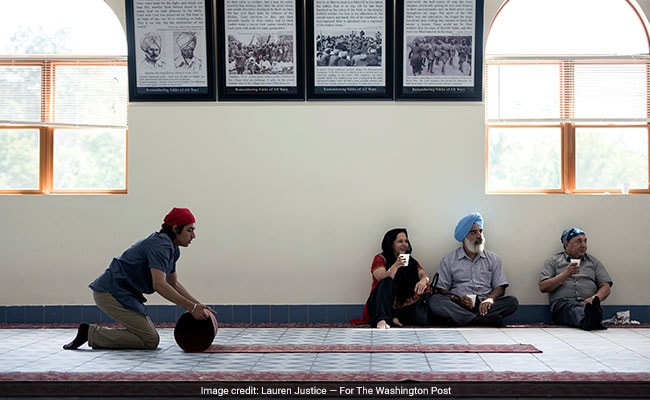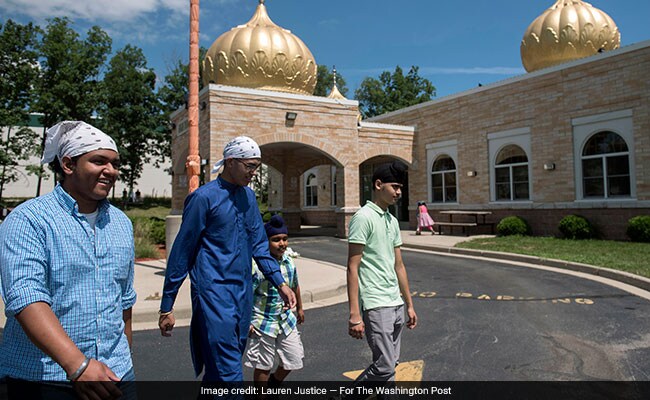
Prabhjot Singh Rathor entered the sanctuary and bowed low toward the holy book at the front of the room.
Prabhjot's father always told him that he must go to the temple every week, so here he was this Sunday, just like every Sunday and usually other days of the week, too. Here he was, at the place where he met his friends and ate his favorite Indian foods and paused quietly to pray.
Here he was, at the place where his father was killed.
Prabhjot had lived in America for less than three months when he witnessed one of the deadliest mass shootings at a house of worship in the United States.
This Saturday will mark the five-year anniversary of the shooting in Oak Creek, when Wade Michael Page killed six members of the Sikh Temple of Wisconsin who were attending Sunday services.
Page, who spent years performing and hearing white supremacist anthems in neo-Nazi rock bands, was killed by police officers at the scene.

A bullet hole on the door frame leading into the Wisconsin gurdwara where children are playing.
For many Americans, Aug. 5, 2012, was the first they ever heard of the Sikh religion, a minority faith that only became known to them in the garish headlines of the massacre. For Prabhjot, it was the day that divided his life into before and after, the day he saw his father's body on the ground just after a gunman shot him.
"That day shattered my world," he wrote in a memoir for a high school assignment.
He was just 12 then, a child who seems very distant from the wary, still-grieving teenager he has become.
Even as he has moved forward - graduating from high school, preparing to start college - Prabhjot still struggles to come to terms with what it means to live in a country that showed him its worst hate in his first days here.
- - -
Before this Sikh temple, known as a gurdwara, joined the list of houses of prayer that have been scarred by hate crimes - from the Birmingham, Alabama, church where four little girls were killed in a bombing in 1963, to the Charleston, South Carolina, church where nine black worshipers were shot in 2015 - it was Prabhjot's first home in America.
Prakash, Prabhjot's father, first heard about this gurdwara from a distant relative. The community of Sikh immigrants from India was growing in the Milwaukee suburbs - it's now estimated at 2,000 to 3,000 families, served by two temples - and this gurdwara needed another priest. Prakash had the training in Sikhism, the 500-year-old monotheistic Indian religion with about 200,000 adherents in the United States.
Prakash and his wife, Ravinder, decided that he would go first, leaving their home in the northern India city of Haridwar. As soon as possible, Ravinder would join him, bringing their two young children.
In the years that followed, Prakash called his son and daughter every night. Prabhjot asked endless questions: What kind of work did he do at the temple? Were there mountains like the ones surrounding him every day in Haridwar?
Prabhjot boasted to the boys he played cricket with in India's dusty streets that someday soon, he'd be leaving for America. They laughed, but before long, he was the one laughing as he boarded his first plane, bound for the place called Oak Creek.
The family of four lived, for those first few weeks, in the temple itself. Then, on a Saturday night at the beginning of August, they spent their first night in their own apartment.
The next morning was Sunday. Prabhjot, his mother and younger sister, Palmeet, went to the temple and waited for the services to start.
At first Prabhjot thought the harsh staccato sound might be fireworks, which he'd heard just weeks before when his dad had taken him to celebrate his first Independence Day. Then the screams started, and he knew it was gunshots.
- - -
Ravinder had been frustrated during the family's brief time together in Wisconsin, bored, unable to speak English and too frightened to drive. So after her husband was killed, she announced to relatives in India that it was time to return home. How could they remain in a country that had shown them such hatred?
Prabhjot thought that if his father had lived, he would have considered leaving too.
"I thought if he would have been alive, he would have moved back to India that day, when that happened," he said. "I would have left too."
But the family's relatives insisted that the children would have more opportunities in America, and they flew in to support Ravinder.
Prabhjot first reluctantly returned to the gurdwara with his mother and sister two days later. Inside - where he had hidden with others in a basement during most of the shooting, then come upstairs to find his father lying on the ground - the carpet was still thick with blood.But what stands out to him now is the scene that greeted the family in the temple parking lot: Hundreds of people of different faiths standing vigil with candles, many wearing white turbans in solidarity with the Sikhs.
In so many different ways, the strangers told them: " 'We know what happened, and it should not have happened,' " Prabhjot recalled.
Walking toward the temple, as candlelight flickered across the faces in the crowd, he was surprised by how comforted he felt.

After meals, the room is cleaned at the gurdwara in Oak Creek, Wisconsin.

Prabhjot Singh, 16, Parminder Jawanda, 14, Manjot Singh, 8, and Prabhjot Singh at the Wisconsin gurdwara.
Track Latest News Live on NDTV.com and get news updates from India and around the world

